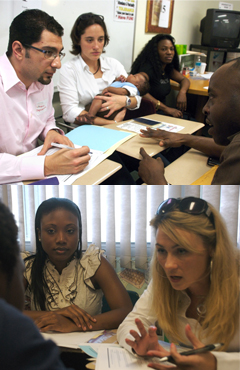'Canes Helping Haiti
Other UM Initiatives

Faculty, students, and programs affiliated with schools and colleges throughout the University of Miami have established contacts with colleagues in Haiti and South Florida to develop ways their respective fields can be beneficial to Haiti’s recovery. They include:
Center for Latin American Studies
The Center for Latin American Studies (CLAS) staff and advisory group are planning a series of Haiti response workshops to bring students, faculty, and staff together from across the University to develop projects to assist the Haitian people. These workshops will include specialists from a broad range of areas, including architecture, business administration, communication, education, engineering, geology, international studies, and medicine.
CLAS is also inviting the participation of colleagues at FIU through the Miami Consortium for Latin American and Caribbean Studies. The goal is to produce funding proposals that directly apply the diverse resources of the two universities to address Haiti’s most pressing problems.
Law Students Helping Haitians to Obtain TPS
The School of Law’s Health and Elder Law Clinic is coordinating assistance for Haitians in Miami to file for Temporary Protected Status with U.S. Immigration and Citizenship Services.
During the month of March, UM Law’s Health and Elder Law Clinic has hosted alternative spring breaks for volunteer law student groups from around the country, who are working to assist with Temporary Protected Status (TPS) efforts. TPS allows Haitians residing in the U.S. prior to the earthquake to work and remain in the country legally.
Law student groups from Stanford University, University of San Francisco, University of Memphis, New England School of Law, and University of Miami School of Law spent their spring break immersed in real-world legal advocacy on behalf of the Haitians who are filing for TPS.
The students spent five full days shepherding each application from the initial intake interview to completing the application with supporting evidence, then sending completed applications to U.S. Citizenship and Immigration Services.
School of Architecture to host “Rebuilding for Resilience” Forum
As scientists and engineers assess Haiti’s risk for future earthquakes and develop recommendations for the safe reconstruction of housing, hospitals, and infrastructure, the University of Miami School of Architecture will host Rebuilding for Resilience: How Science and Engineering Can Inform Haiti’s Reconstruction, a public forum on the rebuilding of the island nation on Monday, March 22 from 7:30 to 9 p.m. at Storer Auditorium. The forum is free and open to the public.
This international multidisciplinary forum is convened by the U.S. National Science and Technology’s Subcommittee on Disaster Reduction and cosponsored by the U.S. Department of State, the U.S. Agency for International Development, and the United Nations International Strategy for Disaster Reduction.
Panelists will include Purdue University Professor of Geophysics Eric Calais, who has worked closely with the Haitian government and with university colleagues there to understand the potential for future earthquakes, and Reginald DesRoches, a Haitian-born professor of civil and environmental engineering at Georgia Tech, who has led several engineering assessment teams in Haiti since the disaster.
For more information, contact Adrienne Jaret at ajaret@med.miami.edu.
In addition, the Haitian government’s Commission for Reconstruction has asked the University of Miami School of Architecture to host a 5-day event to address post-earthquake planning, March 24-28. A collaborative workshop, the Haiti Charrette will provide a forum for Haitian architects, planners and engineers to work with University faculty and students, and design professionals from the Haitian community in Miami, to develop spatial concepts for the government’s vision and its Post-Disaster Needs Assessment, as well as sustainable development models for prototypical communities. It is intended that this work will support the Haitian government’s recommendations to be presented at the Donors Conference for Haiti at the end of March in New York.
The representatives of the Haitian government will include individuals from the Prime Minister’s Bureau of Counselors and the Ministry of Planning and External Cooperation (MPCE), as well as the Comité Interministérield'Aménagement du Territoire (CIAT), which have been formulating the mission of the Temporary Planning Office (TPO).
CSTARS
The Rosenstiel School of Marine and Atmospheric Science’s CSTARS center continues to provide satellite images of the damage caused by the quakes in Haiti and Chile; these images convey information crucial to rebuilding efforts in both countries. CSTARS faculty members including Timothy Dixon are engaged in sophisticated geologic analysis to evaluate Haiti’s risk for future temblors.
School of Nursing and Health Studies
Faculty members from the school, which is involved in a variety of programs and partnerships to assist the people of Haiti, including a maternal-fetal health initiative and minimesters at the Project Medishare facility in Thomonde, Haiti, are rotating through Haiti to provide nursing services in settings including the hospital built by the Miller School of Medicine team.